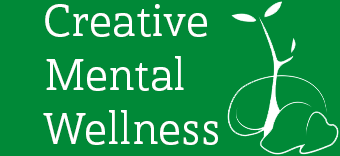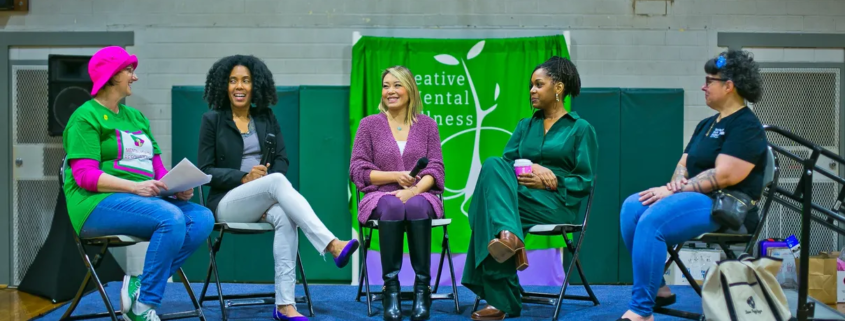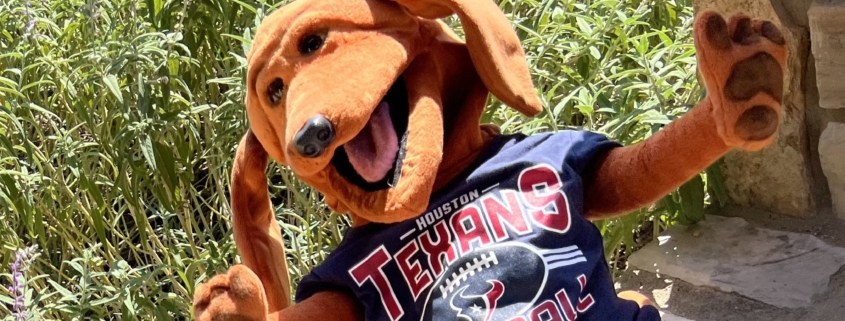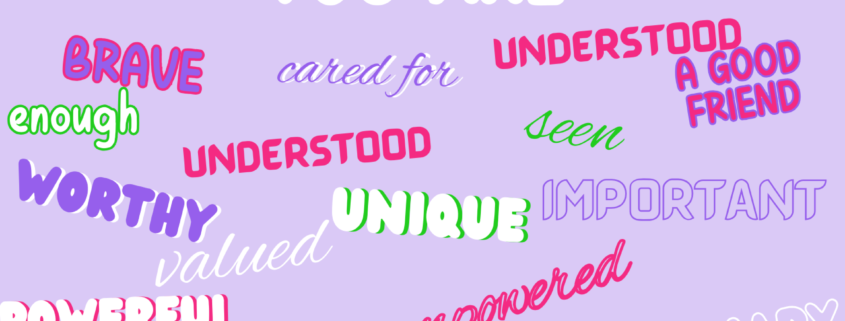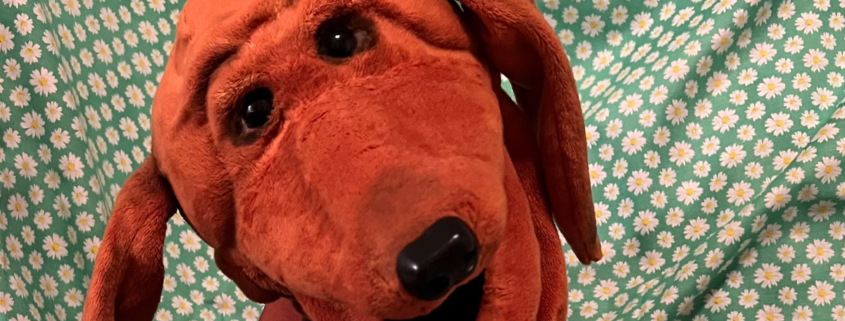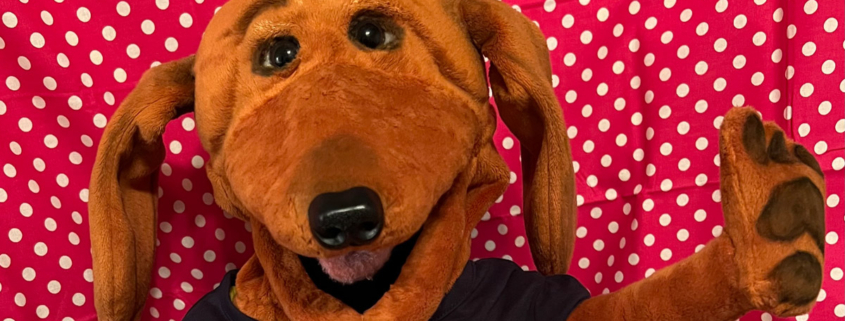January 2025 Newsletter
/0 Comments/in Newsletter/by CMWadminHappy New Year!
January
January is Mental Wellness Month
January 18 we are celebrating Mental Health Resources Day in Houston, TX!
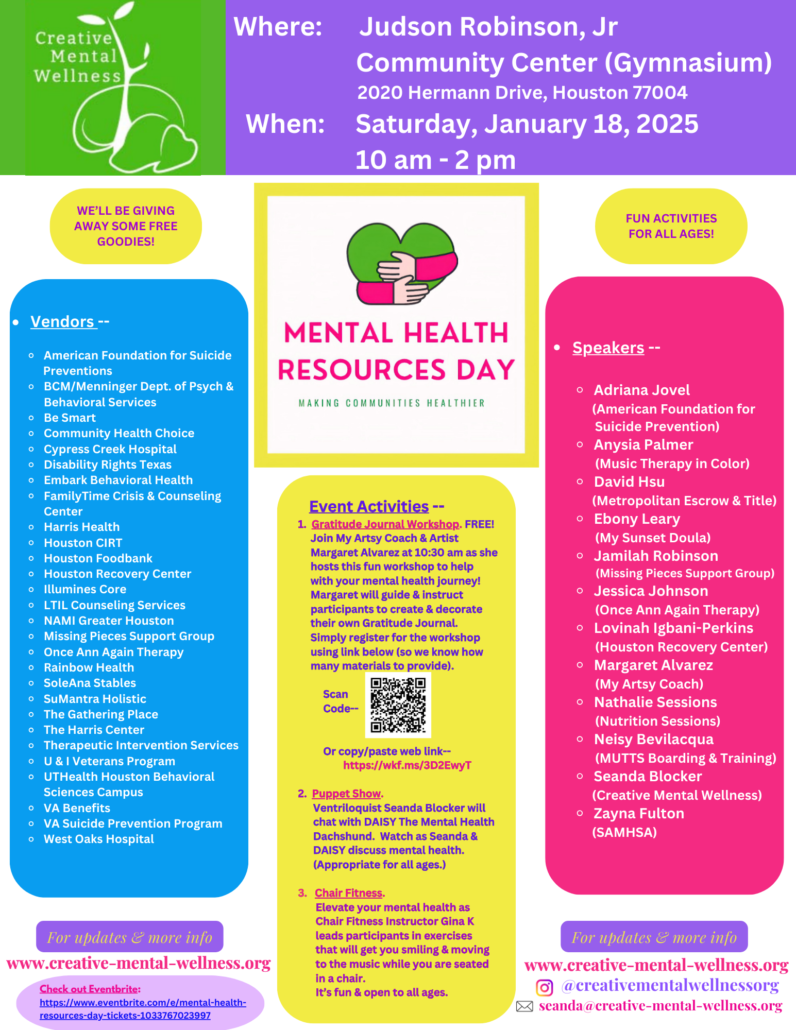
Mental Health Resources Day
With Mental Health Resources Day, we aim to educate the community of local, state, and national resources available for mental health support, from local psychiatrists to NAMI. With speakers from SAMHSA, the Houston Recovery Center, and so many other local services, this event is sure to be both fun and informative!
Volunteer Spotlight
This month we are spotlighting Jimi! Jimi has become an Emerging Scholar through the Emerging Scholars Fellowship Program with Active Minds, and we are lucky enough to have him as a volunteer! He is a valued team member and we are so thankful that he helps with our Youtube channel. Thank you, Jimi!
DAISY’s Book Club
Reading has been shown to improve empathy, and it can help us use our phones less, so reading is a great hobby to pick up! This month, DAISY recommends The Anxious Generation by Johnathon Haidt. This book is really informative on the mental health issues that kids, teens and young adults are now facing with the onslaught of technology, social media and ever-changing social pressures.
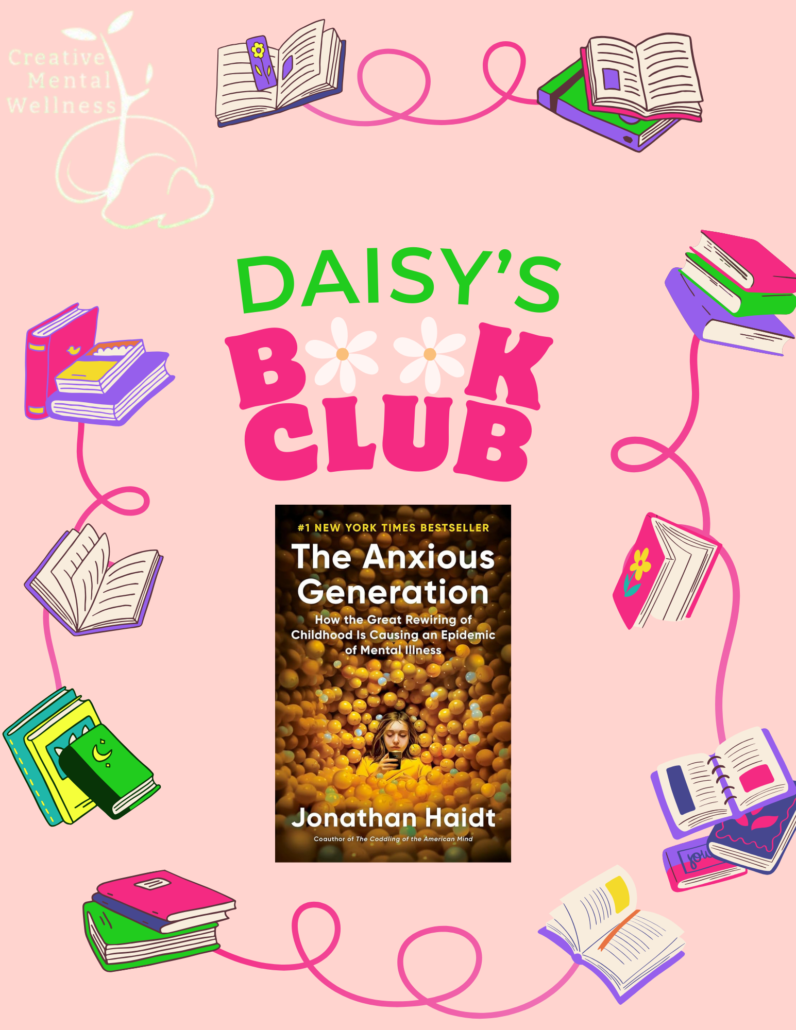
Thank you for joining us on this mental health journey! Follow us on Instagram, Facebook or LinkedIn to stay up to date.
Your friend,

December 2024 Newsletter
/0 Comments/in Blog/by CMWadminDecember 5 is Light Up a Life Day
Reduce Stress This Holiday Season
The holidays are known to be stressful, and can be even harder if you have lost a loved one you used to spend the holidays with. To help reduce stress around the coming holidays, there are a number of techniques you could try, like yoga and meditation, gratitude practices, baking, and spending time in good company. It can be difficult with the pressures to decorate, buy gifts, or host loved ones, but this season is also a good opportunity to appreciate what you have and those you love. If you choose to give gifts, try doing a gratitude practice beforehand – everyone could even write down what they are grateful for, if you don’t want to verbally say what you’re grateful for. Fostering a sense of gratitude can have positive effects on mental wellness and fortitude, thereby reducing stress and improving mood.
Nami also has great resources on managing your mental health during the holidays:
Surviving Painful Holiday Emotions
Avoiding Holiday Stressors
Mindfulness and Meditations for the Holiday Blues
DAISY’s Book Club
DAISY found Bowling Alone: The Collapse and Revival of American Community by Robert D. Putnam an interesting and informative read. It is, as the title suggest, about the lack of community in America, and some of the reasons Americans have shifted away from community, including politics, TV, and a decrease in church-goers. Many people may feel like social media and cell phones are the main cause, but the author says, “voting, giving, trusting, meeting, visiting, and so on had all begun to decline while Bill Gates was still in grade school.”
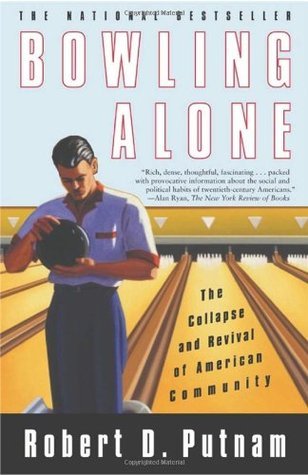
Updates in the Mental Health Sphere and DAISY’s World
Studies have shown that gratitude can reduce feelings of loneliness! If you are feeling lonely, try adopting a gratitude practice – whether you say, write or just think about what you are grateful for, it can help alleviate some of your loneliness.
Creative Mental Wellness has been accepted into the Kroger Community Rewards program! When you shop with your Kroger account, you can help support our mission!
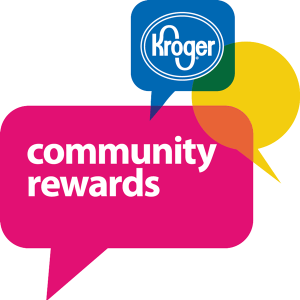
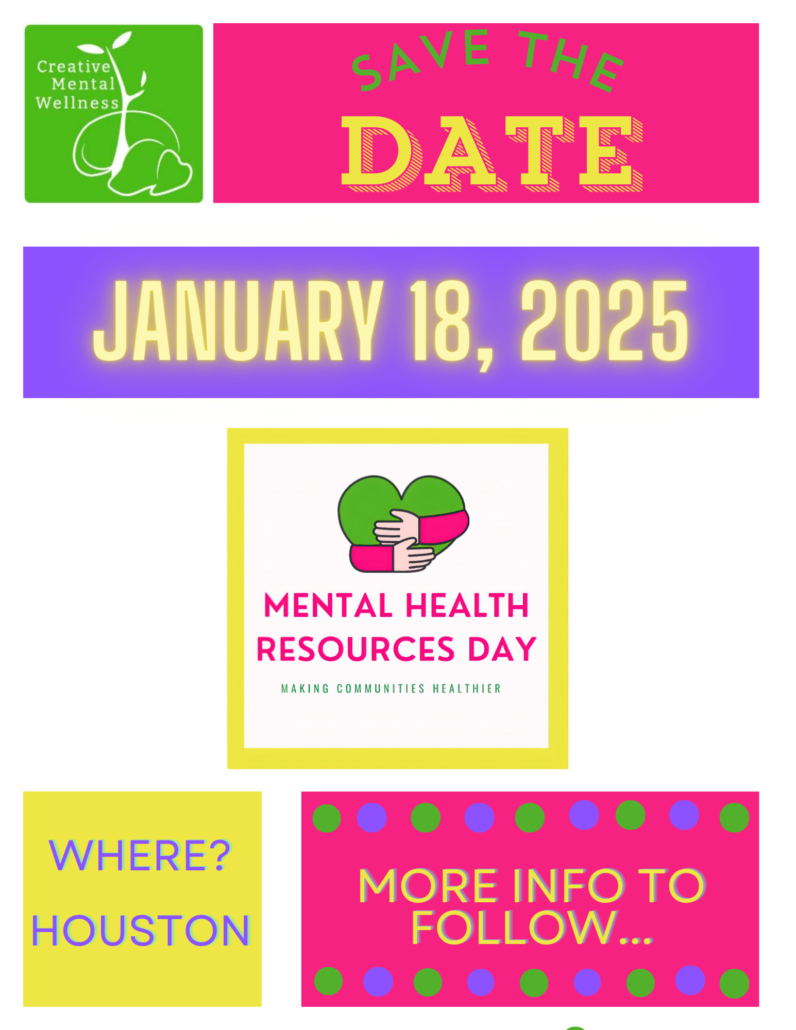
Thank you for joining us on this mental health journey! Follow us on Instagram, Facebook or LinkedIn to stay up to date.
Your friend,

November 2024 Newsletter
/0 Comments/in Newsletter/by CMWadminNovember
November 11-15 is Anti-Bullying Week
November 6 is National Stress Awareness Day
November 12 is Chicken Soup for the Soul Day
November 13 is World Kindness Day
November 23 is International Survivors of Suicide Loss Day
November 25 is International Day for the Elimination of Violence Against Women
Bullying is out – Kindness is in.
Bullying is a near-universal experience. Most people have been bullied or have bullied others, in one form or another. Bullying can be verbal, physical, or social, so even excluding someone intentionally can be considered bullying. This November, try to include others in social situations and being extra kind to those who you think might be getting bullied.
DAISY’s Book Club
DAISY read you are not alone: The NAMI Guide to Navigating Mental Health by Ken Duckworth, MD. This guide includes real stories on people’s experiences with mental health, various therapies and coping methods, so it is both relatable and helpful. It does not really provide a framework on when/where/how to seek help, but it does explore different mental illnesses and treatment options.

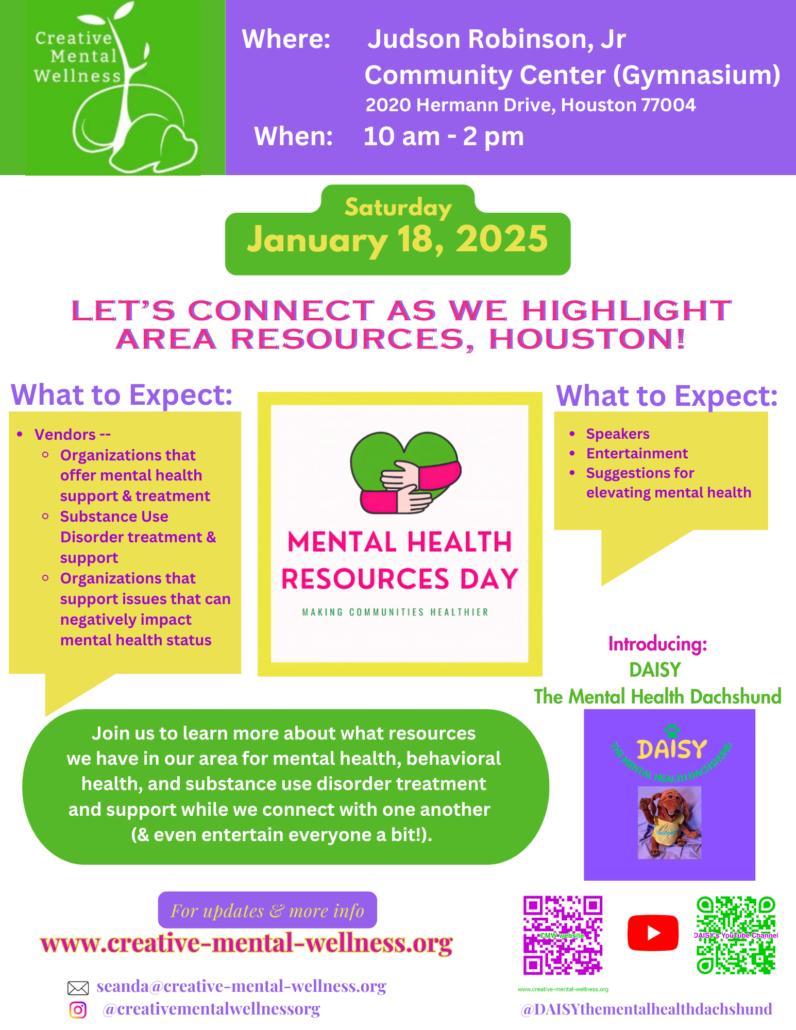
Thank you for joining us on this mental health journey! Follow us on Instagram, Facebook or LinkedIn to stay up to date. And check out our YouTube for informational videos from Seanda and DAISY!
Your friend,

October 2024 Newsletter
/0 Comments/in Newsletter/by CMWadminOctober
October is National Mental Health Awareness Month, Depression Education and Awareness Month, Health Screening Month,
ADHD Awareness Month, and Bullying Prevention Month
October 6-12 is Mental Health/Illness Awareness Week
October 13-19 is OCD Awareness Week
October 7 is National Depression Screening Day
October 9 is National Day Without Stigma
October 10 is World Mental Health Day
World Mental Health Day
Celebrated annually on October 10th, World Mental Health Day reminds us of the importance of mental health and well-being. It’s a time to raise awareness, fight stigma, and advocate for accessible mental health support worldwide. Whether it’s through self-care, open conversations, or seeking professional help, prioritizing mental health is essential for leading a balanced life.
On this day, take a moment to check in with yourself and others. Together, we can create a world where mental health is treated with the importance it deserves.
Updates in the Mental Health Sphere and DAISY’s World
This year, the National Institute of Mental Health is celebrating 75 years! Their symposium’s theme was “Amplifying Voices and Building Bridges,” and featured talks from some incredible researchers who are using their funding, expertise and research to better help the mental health community. For World Mental Health Day, consider watching some of the presentations from the symposium with the following links – Session 1, Session 2, Session 3.
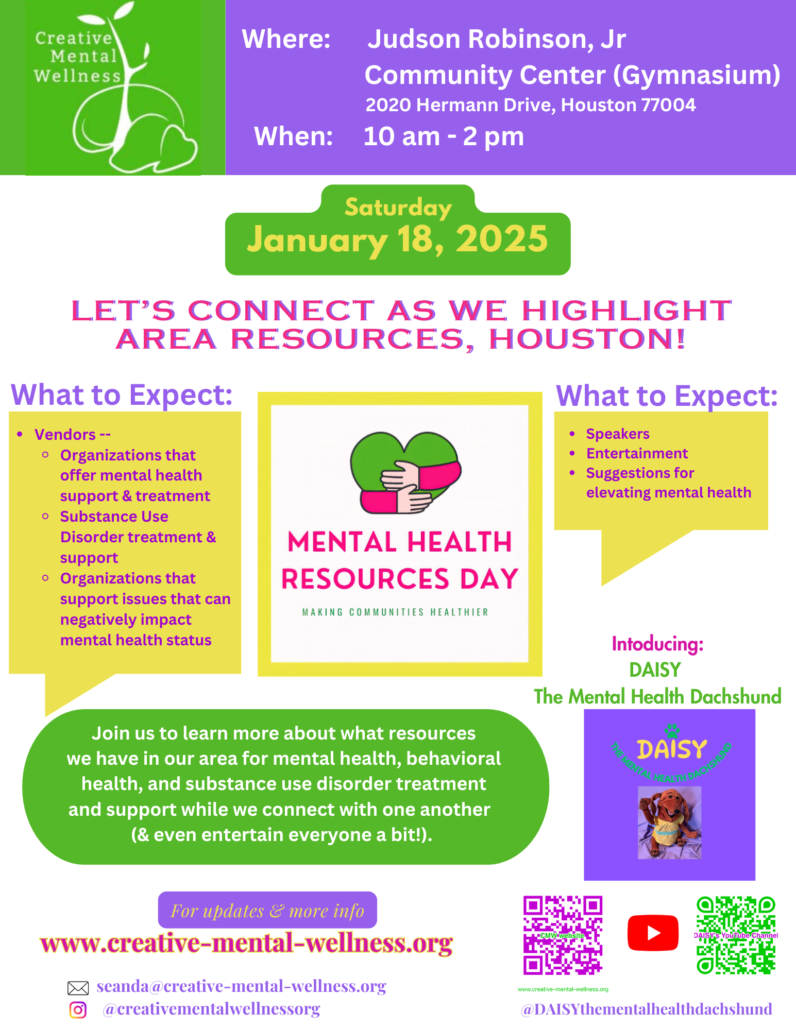
Thank you for joining us on this mental health journey! Follow us on Instagram, Facebook or LinkedIn to stay up to date.
Your friend,

September 2024 Newsletter
/0 Comments/in Newsletter/by CMWadminSeptember
September is Suicide Prevention Month
September 8-14 is National Suicide Prevention Week
September 10 is World Suicide Prevention Day
September 13 is Positive Thinking Day
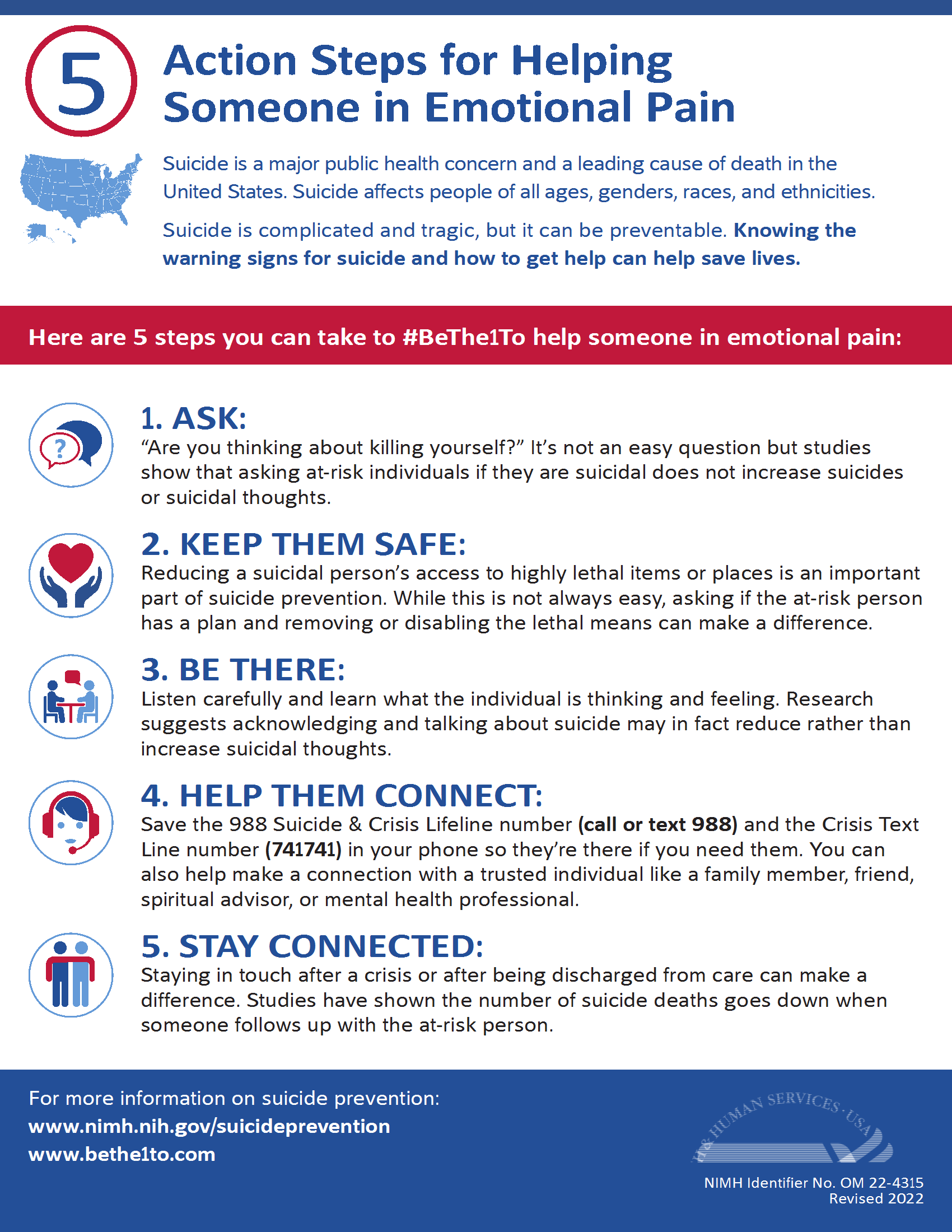
Volunteering: Healing Through Helping
While self-care and mental health often focus on introspection and self-help, volunteering is a powerful yet often overlooked resource for enhancing well-being. By helping others, we also help ourselves. Volunteering pushes us out of our comfort zones, allowing us to develop new skills and build self confidence as we see the positive impact we can make. Additionally, it fosters genuine connections based on shared values and missions, offering a sense of belonging and camaraderie that boosts our mental health. Through these connections, we are reminded that we are not alone in our struggles, creating a supportive network that enhances our emotional well-being.
Volunteering also helps counteract negative emotions associated with mental health challenges, like depression and anxiety. By focusing on others, we shift our perspective from personal struggles to gratitude for our own blessings, fostering resilience and equipping us to handle life’s challenges. As we seek mental wellbeing, we must recognize the transformative potential of helping others. Embracing volunteering is a win-win strategy that impacts both our communities and ourselves, providing healing for the self through helping others.
Updates in the Mental Health Sphere and DAISY’s World
According to the National Institute of Mental Health, preteen suicide rates have been rising since 2008.
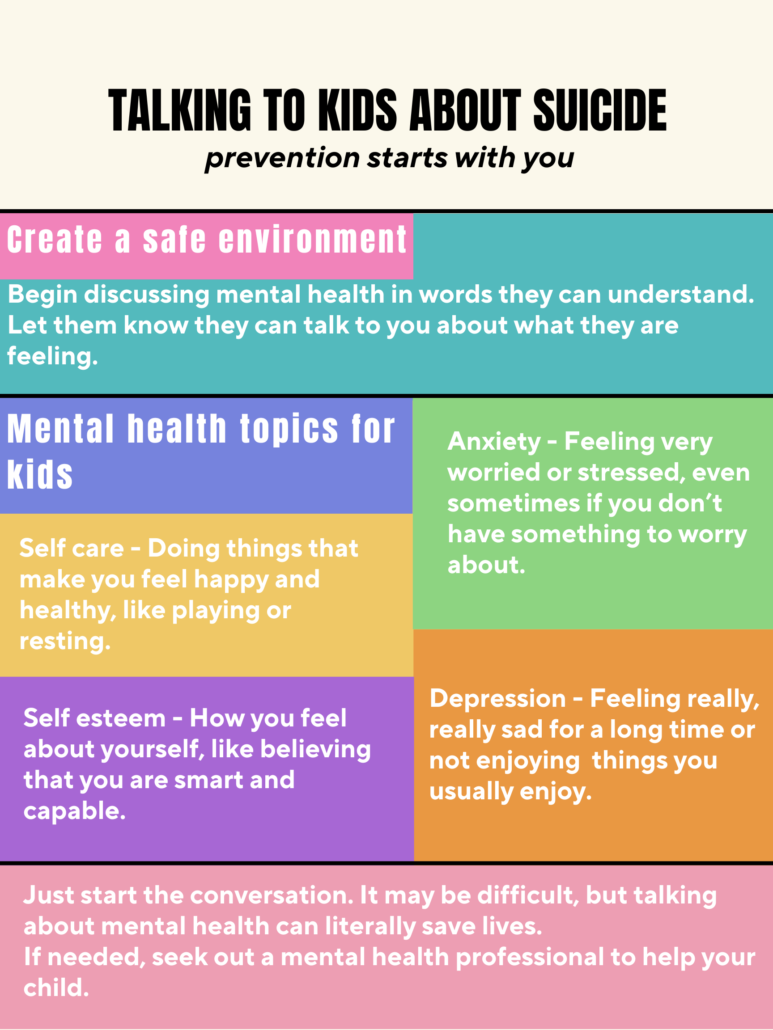
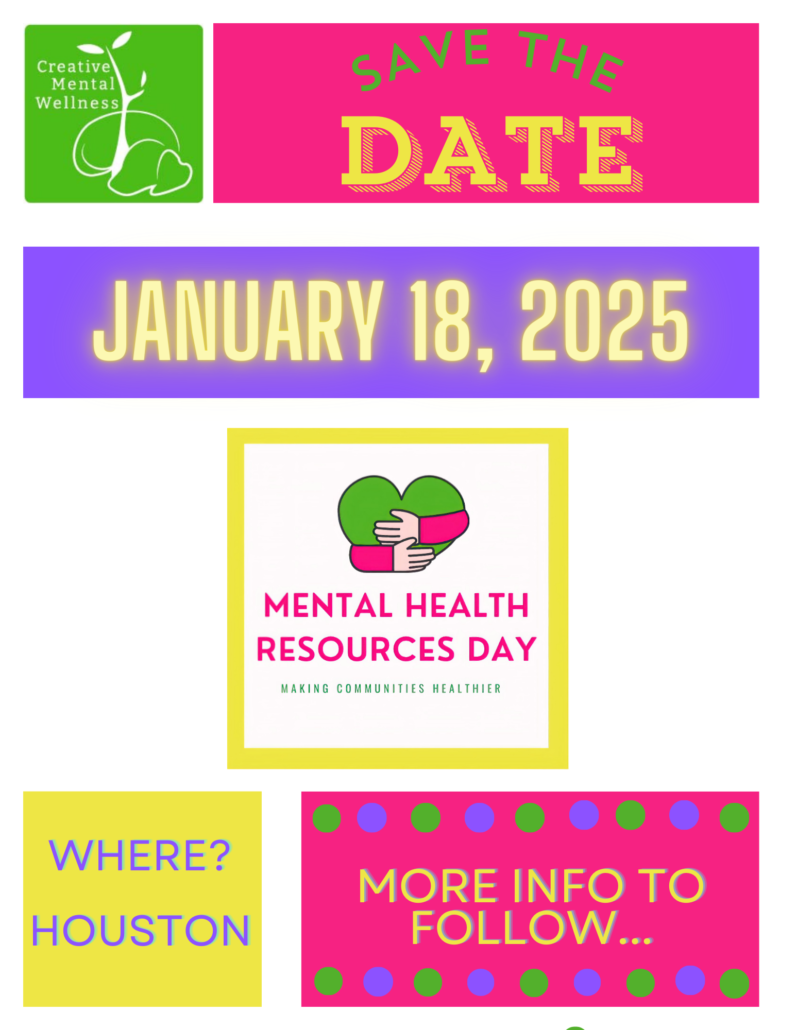
Thank you for joining us on this mental health journey! Follow us on Instagram, Facebook or LinkedIn to stay up to date.
Your friend,

August 2024 Newsletter
/0 Comments/in Newsletter/by CMWadminAugust
August 8 is Happiness Happens Day
August 30 is National Grief Awareness Day
August 31 is International Overdose Awareness Day and National Eat Outside Day
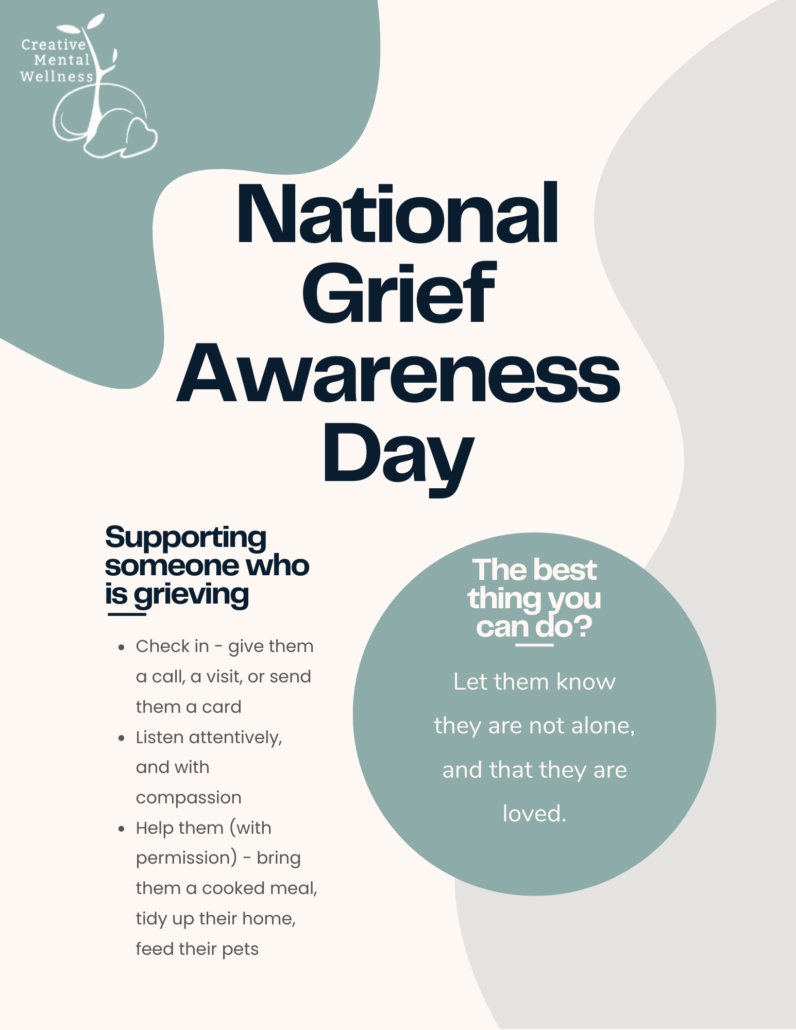
National Grief Awareness Day: An Opportunity for Honoring Loss and Healing
August 30th, National Grief Awareness Day, offers a poignant reminder of the universal experience of loss and the importance of supporting those who are grieving. Established to acknowledge the various forms of grief individuals may endure — from the loss of a loved one to the aftermath of significant life changes — this day serves as an opportunity for education, compassion, and healing.
One of the primary objectives of National Grief Awareness Day is to promote understanding and empathy towards those who are grieving. It encourages open conversations about loss and provides an opportunity for individuals to share their experiences without fear of judgment or misunderstanding. By raising awareness about grief, we can create a more supportive environment where people feel validated in their emotions and supported in their journey toward healing. Also, understanding that grieving a loss is a process helps us remember to continue to reach out to those who have grieved a loss in the past; grief may still be recurring and checking in with them can show support and stave off feelings of isolation and loneliness.
Updates in the Mental Health Sphere and DAISY’s World
You can visit our new website and YouTube channel, but they are still under renovation! You can also still keep up with us through this newsletter and our socials.
In light of National Eat Outside Day, “Spending time in nature — even as little as 10 minutes — can yield short-term benefits for adults with mental illness, according to a new study published in the peer-reviewed journal Ecopsychology.”
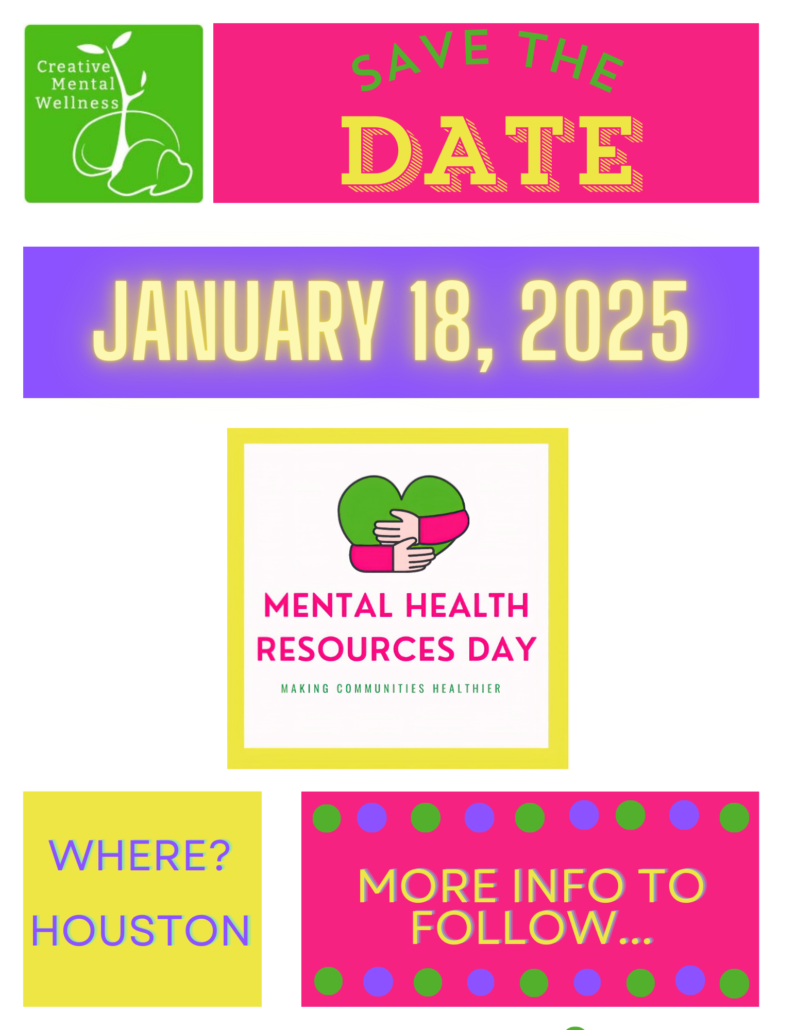
Thank you for joining us on this mental health journey! Follow us on Instagram, Facebook or LinkedIn to stay up to date.
Your friend,

July 2024 Newsletter
/0 Comments/in Newsletter/by CMWadminJuly
July is Minority Mental Health Awareness Month!
July 3 is Start the Conversation Day
July 8 is OneofusisMissing Day
July 23 is Women Touched by Addiction Day
Starting the Conversation
Having regular conversations about mental health to break the stigma
July 3rd is Start the Conversation Day, which makes it a great day to have conversations about mental health. LaShawn Paul, founder of Start the Conversation Day, founder and lead clinician of Social Work Diva said in an interview for Bustle, “It takes one person to start the conversation, but everyone else has to be willing and open and vulnerable.” Start the Conversation with your friends and loved ones on mental health, and be willing to listen when they share – whether it’s sharing personal experiences, discussing new statistics, or providing valuable information. It can be intimidating to have these uncomfortable conversations, but the more often you do it the less uncomfortable they will become.
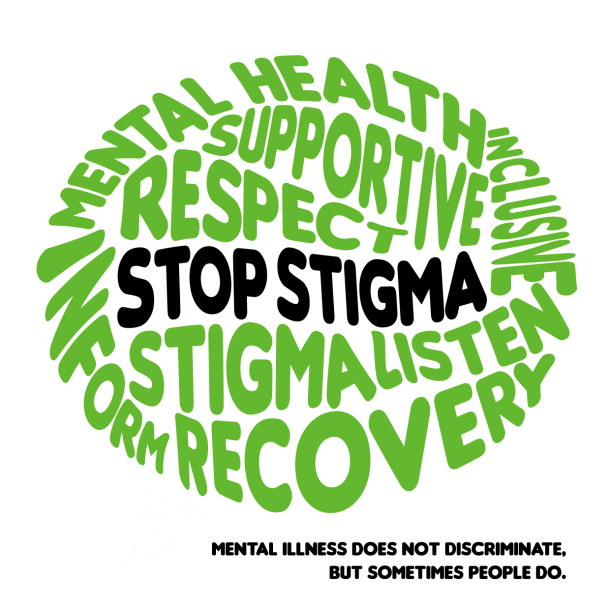
Talking about mental health can help you and those you tell feel less alone. It can really deepen your emotional connections with your loved ones when you share your mental health struggles, stories, or coping strategies. Sharing experiences can create a sense of solidarity and reassurance, dispelling feelings of isolation and fostering empathy.
Moreover, discussing mental health openly helps break down the barriers of stigma that still surround these issues. Each conversation serves as a small yet powerful step toward challenging misconceptions and normalizing discussions about mental well-being. As conversations become more frequent and normalized, the stigma surrounding mental health diminishes, paving the way for greater acceptance and support within communities.
While it’s natural to feel hesitant or uncomfortable at first, the benefits of starting the conversation outweigh the initial discomfort. Talking about mental health not only enhances personal well-being but also contributes to a more compassionate and understanding society. So, on Start the Conversation Day and beyond, let’s embrace the opportunity to speak openly and compassionately about mental health, fostering connections and breaking down stigma one conversation at a time.
DAISY’s Random Acts of Kindness
These are some ways DAISY is spreading kindness this month
- Talking about mental health with her friends of course! She is starting the conversation! She is also going to be listening actively when they share about mental health.
- Sharing information and resources on mental health – like this article on gratitude.
- Connecting with her friend by practicing self care together. DAISY will help break the stigma by sharing her favorite self care activities with her friend – like reading a book she enjoys with a hot tea.

The Random Acts of Kindness Foundation has some other great ideas, and they even have a calendar with a different act of kindness every day!
Thank you for joining us on this mental health journey! Follow us on Instagram, Facebook or LinkedIn to stay up to date.
Your friend,

June 2024 Newsletter
/0 Comments/in Newsletter/by CMWadminJune
June is LGBTQ+ Pride Month!
June 27 is PTSD Awareness Day
Announcements
We are gearing up for Mental Health Resources Day 2025, to be held in Houston again. We are so grateful for our participants in our 2024 event, and hope to have even more speakers and more fun in 2025.
If you or someone you know would like to speak, provide sponsorship, or otherwise get involved with our MHRD 2025, you can respond to this email or reach out to seanda@proton.me
Please also share our flyer!

Just a Piece of You
How “just” puts a lid on you and those around you
“I am just a student.”
“They are just a cashier.”
“I am just a civil engineer.”
Most of us have found ourselves saying something like that. Whether we’re trying to put ourselves down or simply downplay our accomplishments, the word “just” tends to sneak into our vocabulary more often than we realize. But what if I told you that every time you use that word, you’re inadvertently putting a lid on your own potential and diminishing the uniqueness of those around you?
In a world where labels often define us, it’s easy to fall into the trap of reducing ourselves and others to mere titles or roles. But the truth is, behind every “just” lies a wealth of experiences, talents, and aspirations waiting to be acknowledged and celebrated.
Take the example of a student. Sure, they may spend their days buried in textbooks and lectures, but they’re also dreamers, thinkers, and future leaders in the making. By slapping a “just” in front of their identity, we limit their potential and overlook the countless ways in which they contribute to the world around them.
Similarly, when we refer to someone as “just a cashier” or “just a civil engineer,” we fail to recognize the complexity of their skills and the value they bring to their respective fields. Behind the uniform or the job title lies a person with a unique story, passions, and talents that extend far beyond the confines of their profession.
But it’s not just about how we perceive ourselves—it’s also about how we perceive others. When we label someone as “just” anything, we place them in a box, effectively shutting out the possibility of seeing them for who they truly are. This not only limits our understanding of their potential but also perpetuates stereotypes and undermines the richness of human diversity.
So the next time you catch yourself using the word “just,” pause for a moment and consider the implications. Instead of diminishing yourself or those around you, embrace the full spectrum of human potential and celebrate the uniqueness of every individual.
Thank you for joining us on this mental health journey! Follow us Instagram, X, Facebook or LinkedIn to stay up to date.
Your friend,

May 2024 Newsletter
/0 Comments/in Newsletter/by CMWadminMay
May is Mental Health Awareness Month!
This month especially, take care to inform yourself and others about mental health. You can keep an eye out for local events sponsored by mental health non-profits and other organizations like the National Alliance on Mental Illness (NAMI). NAMI holds walks in major metro areas, a convention, and great social media campaigns that you can participate in from your living room! There are numerous companies and organizations working to provide helpful information this month – here are some that we think you should check out:
National Alliance on Mental Illness
Substance Abuse and Mental Health Services Administration
National Institute of Mental Health
Mental Health America
American Psychiatric Association
National Council for Mental Wellbeing
Giving a Warm Welcome to Summer
Physical activity tips to beat the heat
As the semester draws to a close and summer vacation approaches, it is becoming increasingly hotter across the United States. Because of the heat, it can be more uncomfortable and difficult to exercise, especially if you lack access to an indoor gym. There are a myriad ways to beat the heat and keep your physical health in mind this summer though!
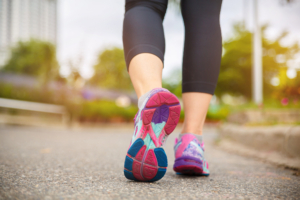
Hydration is of course the most important thing to keep in mind as you sweat or spend time in the sun. Make sure to drink plenty of water before, during, and after exercise and outdoor activities. It can also be beneficial to consume electrolyte-replenishing drinks and foods, like pickle juice and bananas. Even swimming uses your body’s water stores, so plan to be drinking a lot of water as you stay active this summer.
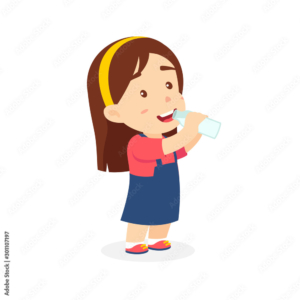
Timing your outdoor activities can help you avoid the hottest parts of the day. Early in the morning is typically the coolest part of the day, and also touts the lowest UV index, so you can worry less about getting sunburnt as well. There are many weather apps and websites that can show you the temperature and UV index by the hour, so you can plan out your day based on the given information; it may not be entirely accurate, but these weather apps give you the best chance for minimizing heat and UV exposure.
Indoor workouts are also a great option, even if you do not have access to equipment. There are so many great Youtube videos for workouts tailored to a variety of different needs, whether they are no equipment, limited mobility, or “beginner friendly.” Pilates and yoga can be great starting points. If a certain video or “influencer” doesn’t fit your physical or mental needs, look for some that do! It is important to find exercises that motivate you, make you feel good, and are good for your wellbeing.
It is great to keep your body moving and to keep physical exercise in your life when possible, but as the seasons change, our bodies and mindsets change. It is okay to change your workout routine, and we recommend keeping hydration, timing, and alternative exercises in mind in the coming months.
DAISY’s Random Acts of Kindness
These are some ways DAISY is spreading kindness this month
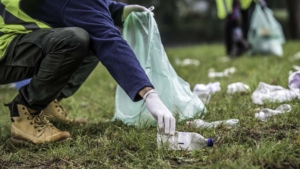
- Helping a friend clean. DAISY helped her friend do some Spring cleaning! Cleaning with a friend is not only quicker, but more fun!
- Picking up litter. When DAISY goes for a walk and sees a piece of trash, she safely disposes of it! She put in extra effort this month to pick up more litter when she is out of the house. Remember: safety first. Wear gloves when picking up litter, and be extra careful with any glass.
- Donating the clothes she no longer wears. DAISY’s spring cleaning made her realize she has some clothes that no longer fit her or her her style. She has no ideas to “upcycle” or alter these items to help fit her life currently, so she is going to donate them to a local secondhand shop.
The Random Acts of Kindness Foundation has some other great ideas, and they even have a calendar with a different act of kindness every day!
Thank you for joining us on this mental health journey! Follow us Instagram, Facebook or LinkedIn to stay up to date.
Your friend,

UPCOMING EVENTS
- There are no upcoming events.
Latest Newsletter
 February 2025 NewsletterFebruary 1, 2025 - 9:20 am
February 2025 NewsletterFebruary 1, 2025 - 9:20 am January 2025 NewsletterJanuary 1, 2025 - 10:47 am
January 2025 NewsletterJanuary 1, 2025 - 10:47 am December 2024 NewsletterDecember 1, 2024 - 8:00 am
December 2024 NewsletterDecember 1, 2024 - 8:00 am
